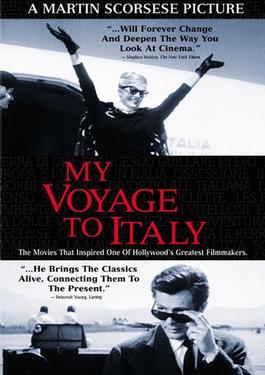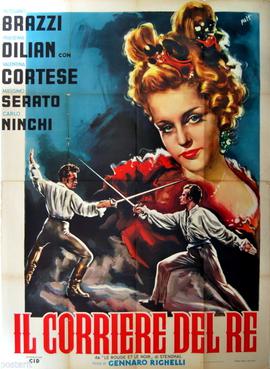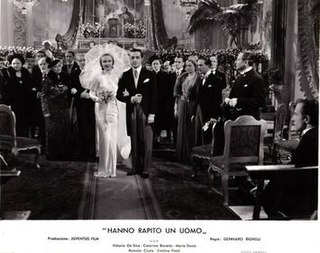
Vittorio De Sica was an Italian film director and actor, a leading figure in the neorealist movement.

Italian neorealism, also known as the Golden Age, was a national film movement characterized by stories set amongst the poor and the working class. They are filmed on location, frequently with non-professional actors. They primarily address the difficult economic and moral conditions of post-World War II Italy, representing changes in the Italian psyche and conditions of everyday life, including poverty, oppression, injustice and desperation.

My Voyage to Italy is a personal documentary by acclaimed Italian-American director Martin Scorsese. The film is a voyage through Italian cinema history, marking influential films for Scorsese and particularly covering the Italian neorealism period.

Telefoni Bianchi films, also called deco films, were made by the Italian film industry in the 1930s and the 1940s in imitation of American comedies of the time in a sharp contrast to the other important style of the era, calligrafismo, which was highly artistic. The cinema of Telefoni Bianchi was born from the success of the Italian film comedy of the early 1930s; it was a lighter version, cleansed of any intellectualism or veiled social criticism.

The Gold of Naples is a 1954 Italian anthology film directed by Vittorio De Sica. It was entered into the 1955 Cannes Film Festival. In 2008, the film was included on the Italian Ministry of Cultural Heritage’s 100 Italian films to be saved, a list of 100 films that "have changed the collective memory of the country between 1942 and 1978."

Lost in the Dark is a 1947 Italian melodrama film directed by Camillo Mastrocinque. It was entered into the 1947 Cannes Film Festival. The film was based on a 1901 play of the same title by Roberto Bracco which had earlier been made into a 1914 silent film. The film's sets were designed by the futurist architect Virgilio Marchi.

Adriana Benetti was an Italian actress.

Two Happy Hearts is a 1932 Italian "white-telephones" comedy film directed by Baldassarre Negroni and starring Vittorio De Sica. It is known for its modernist set designs.

Gennaro Righelli was an Italian film director, screenwriter and actor. He directed more than 110 films in Italy and Germany between 1910 and 1947. In 1930, he directed the first Italian sound film, The Song of Love. He was married to the film star Maria Jacobini, whom he frequently cast in his films.

The Courier of the King is a 1947 Italian historical film directed by Gennaro Righelli and starring Rossano Brazzi, Irasema Dilián and Valentina Cortese. It is an adaptation of the 1830 novel The Red and the Black by Stendhal. It was the final film of the veteran director Righelli, who had previously directed a silent version of the story in 1928. The film's sets were designed by the art director Ottavio Scotti.

Peddlin' in Society or Down With Riches! is a 1946 Italian romance-drama film directed by Gennaro Righelli. it was a loose sequel to the 1945 film Down with Misery by the same director and also starring Magnani.

The Lady Doctor is a 1957 Italian comedy film directed by Camillo Mastrocinque.

Departure is a 1938 Italian comedy film directed by Amleto Palermi and starring Vittorio De Sica, María Denis and Giovanni Barrella. It was shot at the Cinecittà Studios in Rome.
The Two Mothers is a 1938 Italian drama film directed by Amleto Palermi and starring Vittorio De Sica, María Denis and Renato Cialente.

Rubinacci is an Italian luxury clothing company founded in Naples, Italy in 1932 by Gennaro Rubinacci under the name of the London House. The idea Rubinacci had was to create unstructured, unlined jackets meant to be worn outside of the office. Among his early clients were filmmaker Vittorio De Sica and journalist Curzio Malaparte.

They've Kidnapped a Man is a 1938 Italian white-telephone comedy film directed by Gennaro Righelli and starring Vittorio De Sica, Caterina Boratto and Maria Denis. It was shot at the Cinecittà Studios in Rome. The film's sets were designed by the art director Alfredo Montori.

The Amnesiac is a 1936 Italian comedy film directed by Gennaro Righelli and starring Angelo Musco, Checco Durante and Franco Coop. The film's plot is based on a stage play, inspired by the Bruneri-Canella case. It was shot at Cines Studios in Rome. The film's sets were designed by the art director Mario Rappini.
The Last of the Bergeracs is a 1934 Italian comedy film directed by Gennaro Righelli and starring Ketty Maya, Arturo Falconi and Italia Almirante-Manzini.















